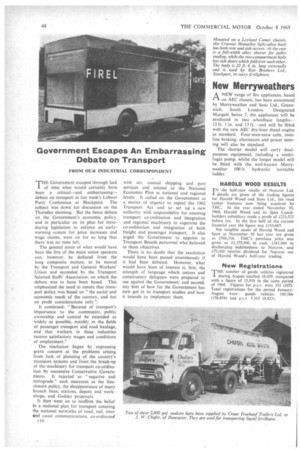Government Escapes An Embarrassing Debate on Transport
Page 46

If you've noticed an error in this article please click here to report it so we can fix it.
FROM OUR INDUSTRIAL CORRESPONDENT
THE Government escaped through lack of time what would certainly have been a critical—and embarrassing— debate on transport at last week's Labour Party Conference at Blackpool. The subject was down for discussion on the Thursday morning. But the fierce debate on the Government's economic policy, and in particular on its plan for introducing legislation to enforce an earlywarning system for price increases and wage claims, went on for so long that there was no time left.
The general tenor of what would have been the line of the main union speakers can, however, be deduced from the long composite motion, to be moved by the Transport and General Workers' Union and seconded by the Transport Salaried Staffs' Association, on which the debate was to have been based. This emphasized the need to ensure that transport policy was based on "the social and economic needs of the country, and not on profit considerations only ".
It continued: "Because of transport's importance to the community, public ownership and control be extended as widely _as possible, notably in the fields of passenger transport and road haulage, and that workers in these industries receive satisfactory wages and conditions of employment."
The resolution began by expressing grave concern at the problems arising from lack of planning of the country's transport systems and from the break-up of the machinery for transport co-ordination by successive Conservative Governments. It rejected as "negative and retrograde such measures as the lineclosure policy, the disappearance of many branch lines, stations, depots and workshops, and Geddes proposals.
It then went on to reaffirm the belief in a national plan for transport covering the national networks of road, rail, river and canal communications. co-ordinated c 16 with air, coastal shipping and port services and related to the National Economic Plan at national and regional levels. It called on the Government as a matter of urgency to repeal the 1962 Transport Act and to set up a new authority with responsibility for ensuring transport co-ordination and integration and regional machinery to supervise the co-ordination and integration of both freight and passenger transport. It also urged the Government to appoint to Transport Boards personnel who believed in these objectives.
There is no doubt that the resolution would have been passed unanimously if it had been debated. However, what would have been of interest is, first, the strength of language which unions and constituency delegates were prepared to use against the Government; and second, any hint of how far the Government has now got in its transport studies and how it intends to implement them.


















































































































































